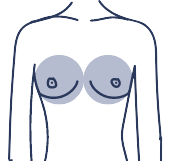Breast Health
This year, it is predicted that 20,825 Australians will be diagnosed with breast cancer, an average of 57 people every day.
The great news is that with improved early detection and treatment more than 90% of people now survive breast cancer. As the most commonly diagnosed cancer in Australia, it’s important to keep an eye on breast health and seek help if you think something isn’t quite right.
Keeping on top of breast health can be as simple as a quick check in the shower. We encourage always getting any new breast symptom checked out including breast pain and breast or underarm lumps. If something feels different, it’s important to book an appointment with your women’s health doctor as soon as possible.
Most breast lumps are not cancer but they usually need to be investigated with the “Triple Test”, which is a sequence of three steps. First of all, breast examination by an experienced doctor. Then breast imaging, (mammography and/or ultrasound ) and third, a biopsy, if required. All of these tests are easily arranged locally.
If you do get a diagnosis of breast cancer, we can help you find the best Breast Care Team to look after you, usually starting with a referral to a breast surgeon. We are fortunate to have some great breast surgeons in Inner West Sydney and most work with multi-disciplinary care teams, involving oncologists, radiotherapy specialists, physiotherapists, cancer care nurses and integrative care doctors. This team approach is usually a great way to make sure you get wholistic care.
Genetics
There is increased understanding of the genetics of breast cancer and it is a good idea for anyone with a family history of breast and/or ovarian cancer to have a thorough discussion to see whether referral to a familial cancer screening clinic is appropriate. There is an online tool to assist in determining your individual risk of developing breast or ovarian cancer called iprevent which can be found at www.canceraustralia.com.au
Many people are not aware that there are medications that can be taken from menopause to significantly decrease your chance of developing breast cancer if you are considered at high risk.
Being proactive is the key to keeping on top of breast health. If you have any questions or concerns, book an appointment to have a chat with one of us here at Inner West Women’s Health.

